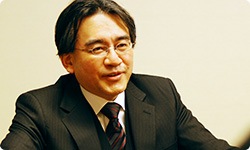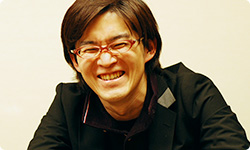4. In Praise of Arguing
Another thing we’re careful about in DEAD OR ALIVE is that when you press a button, it doesn’t go to waste. When the players press a button, the developer’s circumstances don’t matter to them, so as much as possible, we want players to be able to move the character as they wish.
You don’t allow anyone to say, “If the player presses a button here, the game can’t respond.”
Right. It’s an unwritten rule that the staff has.
That’s a sense of values that the core members of Team Ninja share. In making video games, there’s often talk about how the game can’t respond even when players press certain buttons because the animation can’t accommodate that action. (laughs)
There are times when due to game conditions they can’t use certain controls. If they input something, though, that’s because that scene made them want to, so the game has to respond. I say that if you really don’t want them pressing buttons, first make that clear.
That also bears on whether a game will feel stressful or not. Whether that principle runs throughout the whole game makes a difference in the impression that the game makes - the difference between whether it feels bad or not when you play it.

Yes. We’re very careful about the importance we place in not letting the players feel they want to press the buttons there.
Is Team Ninja set up so that everyone shares and discusses such mindsets and rules? Or is there someone who keeps an eye on quality and offers opinions?
Including me, several people do crosschecks.
When did you first become capable of that?
In my second or third year at the company, I became involved with Ninja Gaiden, and when my senior co-workers’ and my own opinions were reflected in the game, midway through, the game suddenly started to feel great. For example, we solved everything without changing a single line of programming, but rather by changing the motion.
Oh. Sometimes everything is going to waste because of the timing between motions. That’s a good experience for one so young.
Yes, I really think so.
It is no sure thing that someone in their second or third year in the gaming industry will have the chance to learn that, no matter how hard they work.
That’s right. You often use the word “fate,” and I feel fate is at work in my life and in all sorts of things. I’m careful to value my relationships with those around me.
A group that makes something is a group of dedicated individual craftspeople. Iwata Asks - Metroid: Other M, I could clearly tell that you were all dedicated craftspeople. Members of highly dedicated groups sometimes conflict with each other the harder they work. How do you get over that?
Oh, we just argue! (laughs)

(laugh)
Really? (laughs) Regardless of seniority, you don’t hold back. You just solve things by having it out.
Yeah. We clash, but really, we each have pride as a craftsperson as we make a game, so development goes well. We can cut to the chase, so I recommend arguing in the workplace! (laughs)
You recommend arguing? (laughs)
Oh, not in a bad way, but trading opinions and saying, “I think this is best,” and “No, I think this is best.”
You openly declare what you believe, and if that’s different from what others believe, you lay it all on the table and say, “Let’s make this clear!” How very fitting for a team that makes fighting games! (laughs)
(laugh)
When a project is over, and it turns out well, those arguments become a good memory, so I always say that we shouldn’t depart from that.
It’s a good memory if you end up making a good product that is evaluated as such by the fans, even if along the way it was hard and friction developed on the team. That reinforces the importance of properly landing a project.
I think so.
It really is important to properly land a project - to connect to results. Despite my best efforts, I haven’t always been able to land my projects. With regard to the ones that I haven’t, my feelings exhibit multiple fractures, so to speak. There must have been a way to do it, so I always look back in regret.
Our staff members really do argue a lot, but for some reason, we all join hands and say, “That went well!” when a project is over. Then, when the next project starts, the next round of arguments starts... We repeat that cycle over and over. It may look like we don’t get along, but actually we’re a very close group! (laughs)